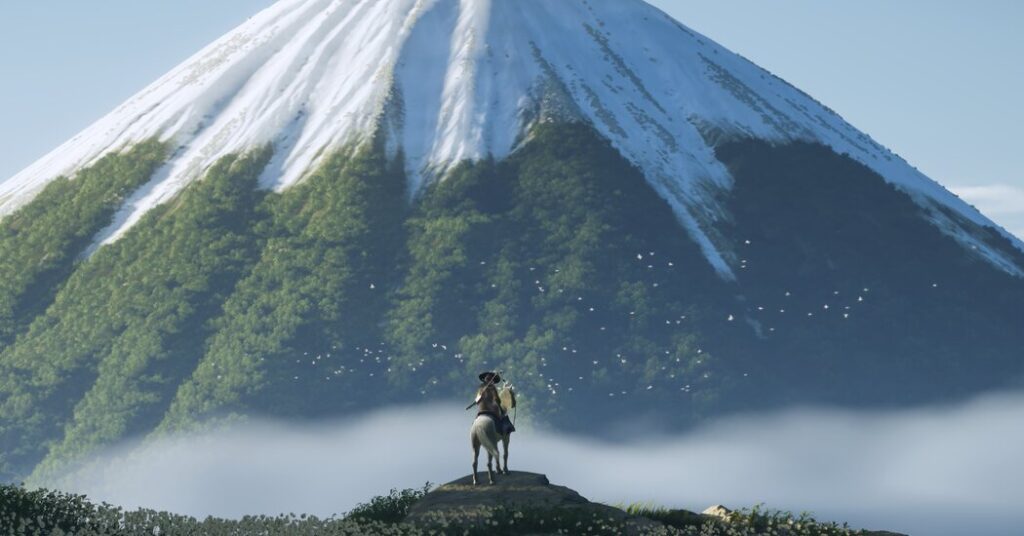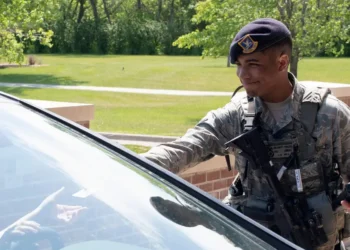Tender music, a sprawling Japanese world and a devastated family moved me within an hour of starting Ghost of Yotei, an alluring open-world game full of the marshy wetlands and breathtaking mountains of feudal Ezo.
Early on, young Atsu, the main character, plays the shamisen with her mother’s careful tutelage. On wooden planks that were part of the family’s tidy homestead, I tapped my controller in rhythm to her mother’s careful instruction to play the three-stringed instrument, a treasured gift from Atsu’s grandmother. Immediately, I was taken back to a time when my own single mother taught me to play “Hey Jude” on my grandmother’s old piano. I was exactly Atsu’s age.
My mother played so easily by ear, just as my aunts did. I did not. But sitting next to her on the piano bench was a wonderful way to learn and bond. It was like Atsu kneeling next to her mother, Yone. There was a powerful connection, as if the notes were musical expressions of genetic chromosomes. This is how the best narrative games shine. They embody the soul of humanity. They stir personal memories. They stay with you.
At its core, Ghost of Yotei is a revenge story with assassination targets and a variety of traditional Japanese weapons. That’s not what intrigued me. In fact, I quickly stopped playing Ghost of Tsushima, the previous entry in the series, because it began with hordes of fighters on horseback in battles where human blood gushed.
Ghost of Yotei, where the bloodletting is tempered by empathy, is one of several games released this year that are steeped in Japanese history. But the horror-based Silent Hill f doesn’t take time to explain its important lore, sending me to books and Wikipedia for perspective about 1960s Japan. Assassin’s Creed Shadows, also set in the medieval era, gets bogged down by too much storytelling, with 15 minutes of banal exposition at the start.
Through its meticulously designed environments, Ghost of Yotei deftly balances the joys of travel, the disappointments of war and the nuance of Eastern philosophy. I had a similar feeling when playing Red Dead Redemption, with its bittersweet cowboy folk tales and moving panoramic views. In both games, I sat silently over a canyon and watched the days change into starry nights, thinking about the oral histories I’d heard and the effusive characters I encountered.
During Atsu’s adventure, she can ride a horse to gallop over the verdant plains and berms. But I often preferred to walk in order to absorb the world’s spiritual nature, its tall grass and rocky ledges. I could pluck mushrooms from under logs or glory in vast beds of gorgeous flowers.
It all made the fighting more palpable. Yes, I was vengeful because my family had been killed. But I wanted to honor the world’s living things, too, as some of the monks I met along the way had suggested.
Ghost of Yotei reminds me of my own travels. It’s been a few years since I wandered around Japan, but I still remember one night. At 3 a.m., when all was silent, I was frightened by something moving forward in the darkness. Was it a monster? No, just a stealthy serow striding down the mountain toward my traveling party as we relaxed in the humid heat of an onsen.
I kept finding striking similarities. Atsu is startled by a wolf looming on a perch. Atsu sits, momentarily trouble-free, in a hot spring overlooking shimmering nature.
Over and over, something poignant was awakened through memory.
This week, I traveled vicariously through the social media posts of a relative as he set forth by foot from Shingu to the Shinto shrine Kumano Nachi Taisha, a scenic but difficult trek that left his shoes in tatters.
It was remarkable how closely that terrain is reflected in Ghost of Yotei. In the game, there are ancient steps, waterfalls and dangerous topography, made easier to traverse because, well, this is ultimately entertainment. It has a dramatic plot to reveal. It’s not life, which can be just as fascinating but slower.
About midway through this epic tale, a murdered innkeeper is revealed, hanging shockingly from wooden rafters. When a child emerges from a hiding place in another room, the adult Atsu, now physically scarred and cynical, commands: “Run home. Hug your mother tight.”
I put the controller aside and thought again about practicing “Hey Jude” as a boy. I had rediscovered the essence of my own wise mother, who died some years ago. Atsu’s mother says, “Music can speak to those who are no longer with us.” So can Ghost of Yotei.
The post Tender Moments in Japan Transcend a Game’s Violence appeared first on New York Times.




